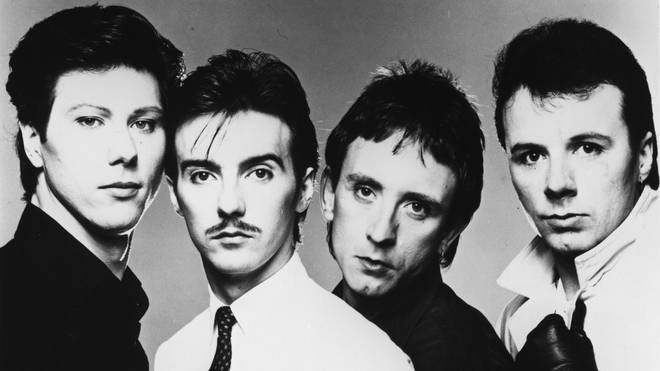Freezing breath on a window pane
Lying and waiting
A man in the dark in a picture frame
So mystic and soulful
A voice reaching out in a piercing cry
It stays with you until
The feeling has gone, only you and I
It means nothing to me
This means nothing to me
Oh, Vienna
The music is weaving
Haunting notes, pizzicato strings
The rhythm is calling
Alone in the night as the daylight brings
A cool, empty silence
The warmth of your hand and a cold grey sky
It fades to the distance
The image has gone, only you and I
It means nothing to me
This means nothing to me
Oh, Vienna
This means nothing to me
This means nothing to me
Oh, Vienna
'Vienna' was a dramatic electronic track that caught the imagination of the public, and became the group's biggest hit.
But what is the song about and what kept it off number one? Here are all the fascinating facts:

Ultravox. Picture: Getty
Who wrote 'Vienna'?
Who wrote 'Vienna'?
Vienna' was written by the band in January 1980.
The classically trained Billy Currie wanted to write something that might sound like it had been written by a late-19th-century romantic composer, and the song's violin solo was influenced by the German composer Max Reger.
The lyrics, which are about a love affair in the city of Vienna, were written by singer Midge Ure.
According to Currie, Ure wasn't a fan of the classical romantic feel of the song's orchestration, and said: "This means nothing to me," to which producer Conny Plank replied: "Well, sing that then."
Ure said that he only had the line "The feeling is gone, this means nothing to me – oh Vienna!" when he went into the studio.
'Vienna' meaning: What inspired the song?
At the time, it was said that the song was inspired by the 1948 film The Third Man, which is based around the Austrian capital of Vienna.
Midge Ure later said that he made up the inspiration when asked what the song was about. He said: "I lied to the papers about [the subject] at the time: the Secessionists and Gustav Klimt, whatever. I didn't know about any of that stuff. I wrote a song about a holiday romance, but in this very dark, ominous surrounding."
Ure is also said to have been influenced by The Walker Brothers' 1978 single 'The Electrician'.
He said of the track: "We wanted to take the song and make it incredibly pompous in the middle, leaving it very sparse before and after, but finishing with a typically over-the top classical ending."
How did it perform in the charts?
The song was hugely successful, and was one of the biggest sellers of 1981.
However, it had to make do with peaking at number two for several weeks, famously being kept off the top spot by novelty song 'Shaddap You Face' by Joe Dolce.
Bassist Chris Cross later said: "It annoyed Midge Ure at the time. This is going to sound terrible, but I quite like that song, I think it's funny."
Where was the video filmed?
The music video, directed by Russell Mulcahy, clearly was inspired by The Third Man. It cost over £6,000, which was rather expensive at the time.
Warren Cann later explained: "It may come as a surprise to know that approximately half of it was shot on locations in central London, mainly at Covent Garden and also in the old Kilburn Gaumont Theatre in North London (now a Bingo hall).
"The embassy party scene was in some house we’d rented in town. Can’t remember where, but I do remember that it took the crew a long time to set up the lights to prepare for filming.
"So long that we all got impatient with waiting and dipped into the many cases of wine we’d laid on for refreshment after the shoot. By the time the crew was ready to film, we were all well partying for real.
"The other half was in Vienna. We did it on the cheap. There was just us and Nick, our trusty camera man.
"We took an early morning flight to Vienna, ran round like loonies in and out of taxis as we filmed, and soon discovered that, due to it being the winter off-season, many of the splendid places we’d been counting upon filming were either shut for redecorating or covered with webs of scaffolding.
“What do you mean it’s ‘closed for repairs’?!” We finished up in the cemetery for the shots with the statue which had been used for the single’s cover (a gentleman who made pianos for the rich and famous of his time, I believe), did the sunset shot, and then dashed back to London to start editing."
The gravestone in the video and on the single cover is part of the grave of Carl Schweighofer, and is found on the Zentralfriedhof in Vienna. Schweighofer was a famous Austrian piano manufacturer.
The song has featured in various TV shows
'Vienna' was referenced in Father Ted, in the 'A Song for Europe' episode, where it is suggested that it was written and performed by a priest called Father Benny Cake, who changed his name so that nobody would know he was a priest.
In Ashes to Ashes, Detective Inspector Alex Drake awakens on a floating brothel in 1981, while 'Vienna'.
The song is heard on Professor Grisenko's Walkman in the Doctor Who episode 'Cold War', set in 1983.
The song is played in the season finale of 13 Reasons Why, over Hannah Baker's final message to Clay Jensen. It is also featured during the intro of the final episode of The Assassination of Gianni Versace: American Crime Story, as Andrew Cunanan (played by Darren Criss) shoots and murders Gianni Versace (played by Édgar Ramírez).
Sem comentários:
Enviar um comentário